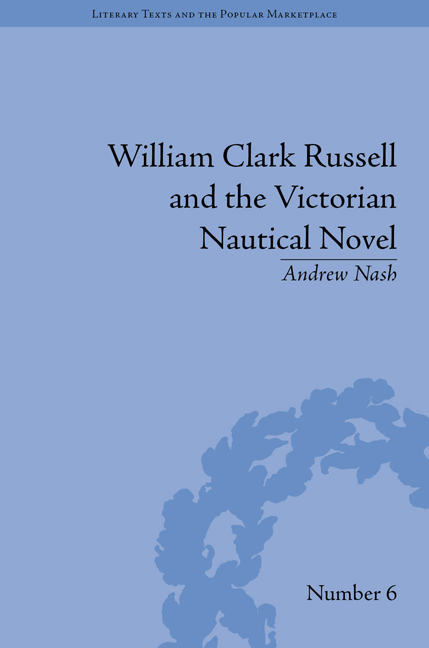Book contents
- Frontmatter
- CONTENTS
- Preface and Acknowledgements
- List of Figures and Tables
- Introduction
- 1 Sailor and Writer
- 2 Writing as a Woman
- 3 Finding the Sea
- 4 Writing the Sea: Genre and Theme
- 5 Writing the Sea: Women and Gender
- 6 Marketing the Sea: Serials
- 7 Marketing the Sea: Books and Publishers
- William Clark Russell: A Bibliography
- Notes
- Works Cited
- Index
Preface and Acknowledgements
- Frontmatter
- CONTENTS
- Preface and Acknowledgements
- List of Figures and Tables
- Introduction
- 1 Sailor and Writer
- 2 Writing as a Woman
- 3 Finding the Sea
- 4 Writing the Sea: Genre and Theme
- 5 Writing the Sea: Women and Gender
- 6 Marketing the Sea: Serials
- 7 Marketing the Sea: Books and Publishers
- William Clark Russell: A Bibliography
- Notes
- Works Cited
- Index
Summary
This book is intended as a contribution to the broadening canon of scholarship on Victorian fiction. More than any other critical or reference work, John Sutherland's Longman Companion to Victorian Fiction (1988; 2nd edn, 2009) has drawn attention to the vast industry of Victorian fiction and the extent to which our critical judgements have been dependent upon a very small sample of novelists, whose careers and literary achievement cannot provide a fully representative picture of what the Victorian novel actually meant to Victorians. Recent scholarship which has attempted to open up the canon and explore the fiction and working lives of popular and less-well-known writers of the period has concentrated mainly on women novelists. Much valuable work has been produced in this area but many male novelists, well known and successful in their day, have also fallen into critical obscurity, and our understanding of the map of Victorian fiction will only become clearer once their experiences are taken into account. Ironically, one of the main themes to emerge from this study is the extent to which the Victorian novel was assumed to be a feminized genre, in terms of its authorship, readership and content. My account of one highly successful male author offers what I hope is a valuable perspective on the pressures of gender, genre and the structures of the literary marketplace which conditioned the ways in which authors sought to make a career out of writing fiction.
- Type
- Chapter
- Information
- William Clark Russell and the Victorian Nautical NovelGender, Genre and the Marketplace, pp. ix - xPublisher: Pickering & ChattoFirst published in: 2014



